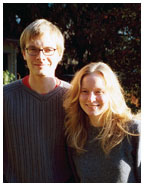
|
May 10, 2006: From the Editor
Brother and sister translators Michael ’98 and Karen Emmerich ’00 (Courtesy the Emmerich family) |
If you are a reader of Japanese fiction, you probably know the work of best-selling writer Banana Yoshimoto. Though you may not realize it, you probably know the work of Michael Emmerich ’98, too.
A graduate student at Columbia in East Asian languages, Emmerich has translated five of Yoshimoto’s books from Japanese into English. He got his start in Princeton’s renowned creative writing program, where he was a student in one of the program’s small and intense classes in translation. Beginning on page 22, PAW contributor David Marcus ’92 takes us into these classes and introduces us to the students who begin with the words of other writers to create their own works of art.
Emmerich — whose sister, Karen Emmerich ’00, is quickly establishing her own reputation as a translator of Greek fiction and poetry — has chosen a difficult path. The field of translation is one of the least appreciated, and one of the most poorly paid, in the literary world. Fortunately, writers and academics have begun to recognize the value of translation and the skills needed to do it well.
In a recent interview with the online Quarterly Conversation, Emmerich was asked about the fact that few works in translation are read in the United States.
“It’s awful! It’s a scandal! But most of all, it’s really regrettable,” Emmerich responded. “The biggest reason for people in the United States to read more translations is that there’s a hell of a lot of amazing stuff being written ... all around the world. Most of us have, at least at one point in our lives, come across writers or books that really changed the way we think, or feel, or what we like, or something else about us. There are a lot of terrific writers working in English, of course, but there are even more writing in other languages. ... People who don’t read translations would be like the proverbial frog at the bottom of the well that believes it knows the whole world.”
In our second feature story, Mark F. Bernstein ’83 describes some of the challenges confronting Princeton’s Woodrow Wilson School and how Dean Anne-Marie Slaughter ’80 has gone about addressing them since her arrival in 2002, through curriculum changes, faculty hirings, and outreach to a public with little trust in government.
How those changes relate to the lawsuit filed against Princeton by members
of the Robertson family, which alleges that money donated to support and
expand the school’s graduate program was used improperly, is unclear.
But since Slaughter’s arrival, the school has been expanding its
influence and profile in the world of government and public service. These
efforts could not have come at a more crucial time: According to one organization
dedicated to public service, Bernstein reports, the federal government
is about to experience a brain drain, with six in 10 federal workers on
the verge of retirement. ![]()
![]()
Marilyn H. Marks *86
mmarks@princeton.edu

